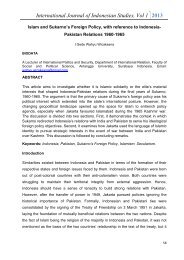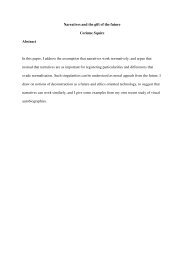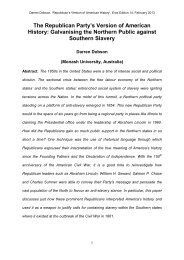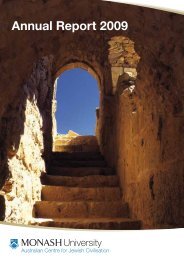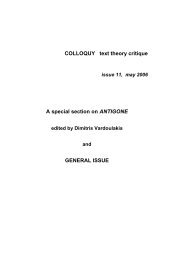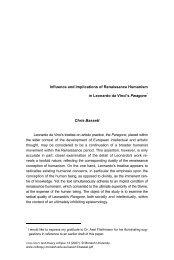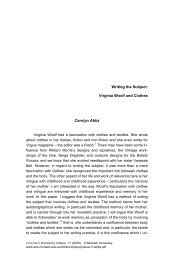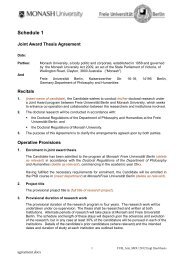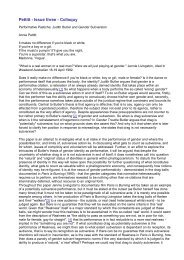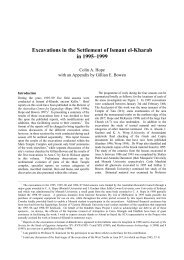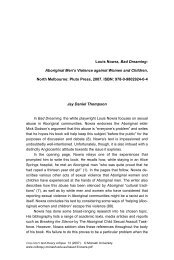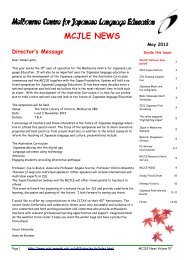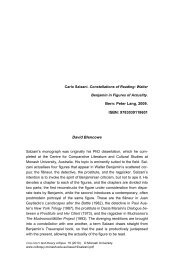The Acknowledgement of Love in Sarah Ruhl's Drama ... - Arts
The Acknowledgement of Love in Sarah Ruhl's Drama ... - Arts
The Acknowledgement of Love in Sarah Ruhl's Drama ... - Arts
Create successful ePaper yourself
Turn your PDF publications into a flip-book with our unique Google optimized e-Paper software.
░ <strong>The</strong> <strong>Acknowledgement</strong> <strong>of</strong> <strong>Love</strong> <strong>in</strong> <strong>Sarah</strong> Ruhl’s <strong>Drama</strong> 15Orpheus out <strong>of</strong> the underworld? It’s uncerta<strong>in</strong>. At the end <strong>of</strong> the play, Eurydiceis brac<strong>in</strong>g to marry the <strong>in</strong>sufferable Lord <strong>of</strong> the Underworld after shedips herself <strong>in</strong> the river and forgets her lost loves. Ruhl, however, refuses to<strong>of</strong>fer romantic love as an unproblematic alternative to nostalgic love. Ultimately,the play suggests that neither form <strong>of</strong> love can flourish <strong>in</strong> the world.Both demand a k<strong>in</strong>d <strong>of</strong> unsusta<strong>in</strong>able unity between <strong>in</strong>dividuals <strong>in</strong> the case<strong>of</strong> romantic love and between past and present <strong>in</strong> the case <strong>of</strong> nostalgiclove.Acknowledg<strong>in</strong>g Another <strong>Love</strong>Midway through the play, Orpheus <strong>of</strong>fers a gift to his bookish wife who bynow has connected warmly with her father:Orpheus holds the Collected Works <strong>of</strong> Shakespeare with a longstr<strong>in</strong>g attached.He drops it slowly to the ground. (CH, 376)Eurydice has no idea what the book could possibly be. “She is wary <strong>of</strong> it, asthough it might bite her” (CH, 376). After she throws it <strong>in</strong> frustration, her fatherpicks it up, opens it, and reads a passage from K<strong>in</strong>g Lear:We two alone will s<strong>in</strong>g like birds <strong>in</strong> a cage.When thou dost ask my bless<strong>in</strong>g, I’ll kneel downAnd ask <strong>of</strong> thee forgiveness; so we’ll live,And pray and s<strong>in</strong>g … (CH, 377)This is part <strong>of</strong> Lear’s speech to his daughter Cordelia at the beg<strong>in</strong>n<strong>in</strong>g <strong>of</strong>the f<strong>in</strong>al scene <strong>of</strong> K<strong>in</strong>g Lear just before Edmund sends them <strong>of</strong>f to prison.<strong>The</strong>se are Lear’s last words to Cordelia before Edmund’s servants kill her<strong>of</strong>f stage. <strong>The</strong>se words, then, carry extra weight when Eurydice’s fatherspeaks them just before she heads <strong>of</strong>f with Orpheus.A closer look at K<strong>in</strong>g Lear and, <strong>in</strong> particular, Stanley Cavell’s wellknownread<strong>in</strong>g <strong>of</strong> it <strong>of</strong>fers us a way to identify a k<strong>in</strong>d <strong>of</strong> love Eurydice endorses<strong>in</strong> the wake <strong>of</strong> Eurydice’s two lost loves. For Cavell, K<strong>in</strong>g Lear is aplay that documents the lengths people go to avoid love from others. <strong>The</strong>yare motivated to avoid love, Cavell says, because the act <strong>of</strong> acknowledg<strong>in</strong>gsuch love demands a potentially pa<strong>in</strong>ful recognition <strong>of</strong> one’s own vulnerability.Crucial to Cavell’s understand<strong>in</strong>g <strong>of</strong> the play is a dist<strong>in</strong>ction he makesbetween know<strong>in</strong>g and acknowledg<strong>in</strong>g; th<strong>in</strong>gs <strong>in</strong> the world lend themselvesto cognitive knowledge, but people upend the categories a person uses toconceptually place th<strong>in</strong>gs <strong>in</strong> the world. 27 Gerald Bruns expla<strong>in</strong>s <strong>in</strong> his essay



